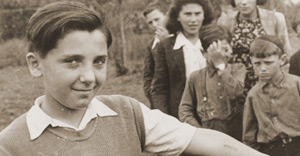Fiction
“Like Ben Hur, but bigger and better.”
As the war ends and she comes down from the mountains of Slovakia, a Jewish girl discovers that she can still be “moved by something other than the mere struggle for existence.”
Reissuing a forgotten work of a founding father of Zionism.
Laura Z. Hobson’s The Gentleman’s Agreement, a best-selling 1947 novel, brought American “genteel” anti-Semitism into the limelight, especially after it was turned into a movie.. . .
What does it mean to be “pro-Israel” on campus today? A new novel tells the tale.
In Kristol’s only published work of fiction, a guilt-ridden GI confronts an aggressive young Holocaust survivor.
In Harry Kemelman’s “Rabbi Small” novels, a proudly Jewish cleric confronts issues and solves mysteries with the aid of insights psychological, sociological, and theological.
In his second novel on the Holocaust, the British writer has delivered an almost unbearable work—and a timely corrective to today’s promiscuous talk of “genocide.”
In Call It Sleep (1934), Henry Roth produced a masterpiece—and then, in his four-volume, late-life autobiographical novel, a human document without parallel in American Jewish literature.
To the bestselling novelist Gary Shteyngart, the success achieved by Soviet Jewish immigrants in America is a tragic sellout. He should speak for himself.
No rabbi spoke at the celebration of Jeanne’s life. But neither of her two sisters would forgive the other for her death. (A Story)
New translations of Georges Simenon’s Inspector Maigret novels should have come with a cover warning: copious anti-Semitism within.
In a character in his 1899 novel McTeague, Frank Norris, drawing in part on the work of Jewish thinkers, may have created the most. . .



